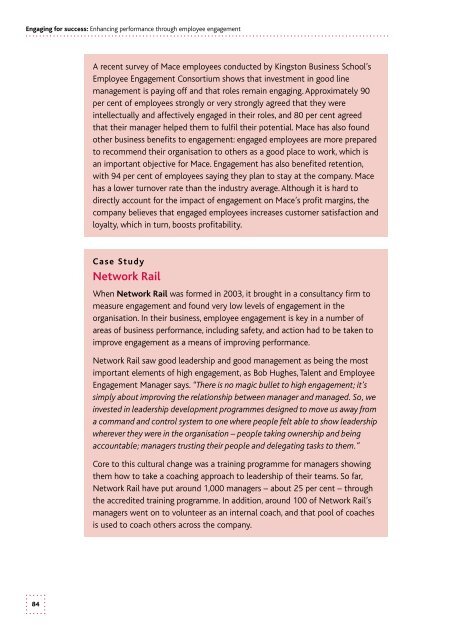3ytgeaf
3ytgeaf
3ytgeaf
Create successful ePaper yourself
Turn your PDF publications into a flip-book with our unique Google optimized e-Paper software.
Engaging for success: Enhancing performance through employee engagement<br />
A recent survey of Mace employees conducted by Kingston Business School’s<br />
Employee Engagement Consortium shows that investment in good line<br />
management is paying off and that roles remain engaging. Approximately 90<br />
per cent of employees strongly or very strongly agreed that they were<br />
intellectually and affectively engaged in their roles, and 80 per cent agreed<br />
that their manager helped them to fulfil their potential. Mace has also found<br />
other business benefits to engagement: engaged employees are more prepared<br />
to recommend their organisation to others as a good place to work, which is<br />
an important objective for Mace. Engagement has also benefited retention,<br />
with 94 per cent of employees saying they plan to stay at the company. Mace<br />
has a lower turnover rate than the industry average. Although it is hard to<br />
directly account for the impact of engagement on Mace’s profit margins, the<br />
company believes that engaged employees increases customer satisfaction and<br />
loyalty, which in turn, boosts profitability.<br />
Case Study<br />
Network Rail<br />
When Network Rail was formed in 2003, it brought in a consultancy firm to<br />
measure engagement and found very low levels of engagement in the<br />
organisation. In their business, employee engagement is key in a number of<br />
areas of business performance, including safety, and action had to be taken to<br />
improve engagement as a means of improving performance.<br />
Network Rail saw good leadership and good management as being the most<br />
important elements of high engagement, as Bob Hughes, Talent and Employee<br />
Engagement Manager says. “There is no magic bullet to high engagement; it’s<br />
simply about improving the relationship between manager and managed. So, we<br />
invested in leadership development programmes designed to move us away from<br />
a command and control system to one where people felt able to show leadership<br />
wherever they were in the organisation – people taking ownership and being<br />
accountable; managers trusting their people and delegating tasks to them.”<br />
Core to this cultural change was a training programme for managers showing<br />
them how to take a coaching approach to leadership of their teams. So far,<br />
Network Rail have put around 1,000 managers – about 25 per cent – through<br />
the accredited training programme. In addition, around 100 of Network Rail’s<br />
managers went on to volunteer as an internal coach, and that pool of coaches<br />
is used to coach others across the company.<br />
84


